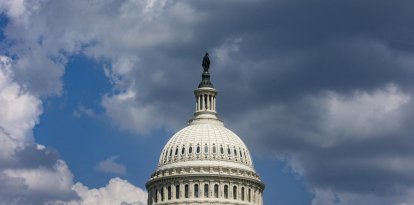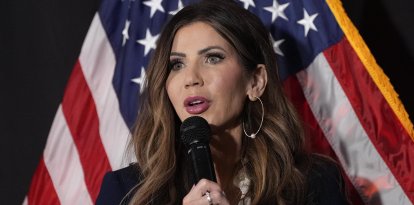Federal judge upholds Iowa's ban on mandatory teaching of gender identity and sexual orientation
In his decision, Judge Locher upheld the ban on the mandatory teaching of these topics, arguing that it does not specifically discriminate against information about LGBTQ issues, although he limited its scope.

Iowa Gov. Kim Reynolds (File)
A federal judge appointed by President Biden, Stephen Locher, issued a ruling Thursday that partially upholds an Iowa law from 2023 that bans the teaching of gender identity and sexual orientation in schools from kindergarten through sixth grade.
However, the judge struck down parts of the law as overly broad, protecting students' participation in voluntary activities related to these issues and to access materials not specifically targeted to them.
The law, signed by Republican Gov. Kim Reynolds, prohibits Iowa school districts from offering “any program, curriculum, test, survey, questionnaire, promotion, or instruction relating to gender identity or sexual orientation to students in kindergarten through grade six.”
In his decision, Judge Locher upheld the ban on mandatory instruction on these topics, arguing that it does not specifically discriminate against information about LGBTQ issues.

Politics
Iowa: Governor signs law allowing 18-year-olds to purchase and carry handguns
Carlos Dominguez
However, he found that references to "programs" and "promotion" in the law are too vague and violate the First Amendment. According to Locher, these restrictions have led to overly strict interpretations by some school districts, such as the removal of pride flags, "safe spaces" stickers in high schools, and the banning of locker room posters promoting LGBTQ groups, for fear that younger students would see them.
Teachers in same-sex relationships have also been directed to avoid mentioning their partners around students.
“Under this plain meaning interpretation, the restrictions on ‘programs’ and ‘promotion’ run into constitutional problems under the First Amendment," Locher wrote in his ruling.
He further noted the "absurdity problem" of banning "programs" related to gender identity, suggesting that this could be interpreted as a ban on activities such as sports teams of "girls" and "boys" or any initiative that recognizes gender identity.
This is not Locher's first ruling against components of the same law.
In March, the judge blocked a provision banning school libraries from publishing books with depictions of sex acts. For its part, the state of Iowa is appealing that decision.

























